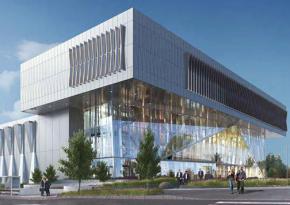Why do the Seattle cops want a fortress?
reports from Seattle on protests against a planned police station.
HUNDREDS TURNED out to a Seattle City Council meeting on August 15 to demand that council members "block the bunker"--and halt plans to build what would be the most expensive police station in North America.
If built, the bomb-proof, ballistics-proof police building planned for North Seattle will include a firing range, two underground floors, a large parking garage and a state-of the-art training facility. The price tag is a whopping $149 million, which is down from its previous cost of $160 million as a result of public outcry.
A coalition called Block the Bunker formed over the last few months to stop this monstrosity, arguing that it will steal funding from other badly needed social services. Since 2013, the city has held just three public discussions about the plans to build the facility, all of them poorly publicized and poorly attended until the Block the Bunker campaign brought 4,000 signatures to the City Council in opposition to the project.
Activists also criticized the fact that the project has observed no racial equity impact assessment, and neither the Office of Civil Rights nor communities of color were consulted about the details of the project.

During the two-hour meeting, people who testified echoed these sentiments--pointing out the misplaced priorities of the project and opposition to police murders and brutality against Black and Brown people.
"This is an outrage when you have homeless people sleeping on the streets right outside City Hall," said one speaker, "and the city is doing nothing about it."
Many stressed the need for affordable housing in Seattle--a city with thousands of homeless people whose numbers are rising all the time. As the statement from No New Jim Crow, a group that opposes mass incarceration, argued:
The City of Seattle has declared a State of Emergency around homelessness. Yet the number of homeless people in the city goes up every year...Instead of spending $160 million on building low income housing, the city is proposing to better house the already well-housed, the police.
Other people focused on the everyday violence perpetrated by Seattle police. "There is a war against Black and Brown people in this country," said one speaker. "If you vote for this bunker, you have chosen your side in the war. You cannot be for racial equality and support this bunker!"
Tachini Pete agreed. "To me, it's like a fort, a way to oppress people," Pete said. "I don't believe the police need a castle."
Many speakers noted that Seattle police are under Department of Justice oversight for their use of "excessive force" and for bias against people of color. The speakers asked why the department should be rewarded for its bad behavior.
The City Council chamber was filled for the meeting, with some 150 people packed in after more than 100 people who had been watching the event in an overflow room demanded to be let in. Security guards tried to keep out people who wanted to speak in the chamber, forcing the meeting to be suspended, as chants of "Let them in!" rang out while guards pushed and shoved protesters.
Finally, protesters won, and everyone went in, taking over the meeting room for an impromptu speak-out, chanting, "This is what democracy looks like!"--a chant made famous during 1999 anti-globalization demonstrations in Seattle against the World Trade Organization. After 15 minutes, the formal meeting resumed.
THERE'S STILL a lot of organizing to do. After the meeting, the council agreed to decrease the price of the project and modify its resolution leaving the final price open. It also said it would apply the city's "Racial Equity Toolkit" to the project.
The final decision on the project will come in November as part of the vote on the city budget. A motion to table the vote until September 12 received only two votes out of eight councilors present. Even the council member who proposed the postponement, Mike O'Brien, is still generally in favor of the project. The only council member firmly opposed to the bunker is socialist Kshama Sawant, who was out of the country during the vote.
It was obvious to everyone attending the meeting that the councilors live in a different world from most Seattle residents. In what world is having a new bomb-proof bunker more important than housing thousands of people during a homeless emergency?
In what world is further militarizing the police a good idea when the police are already engaged in a campaign of racist murder all over the U.S.? In what world will a "racial equity toolkit" absolve the city when it further augments a racist police force?
Most disappointing to some participants was the failure of supposedly progressive city councilors to oppose this bunker. Even those somewhat critical of cost overruns still prioritize supporting the police over supporting the homeless and people of color.
Councilor Lorena Gonzalez, who chairs the Public Safety Committee, uses her background as a civil rights attorney to win support for the bunker. She tries to reconcile the irreconcilable by supporting the new police station while claiming to support Black Lives Matter. Some councilors argue that the new facility will provide training rooms so the police can learn to be more humane as mandated by the Department of Justice.
But as one speaker put it, "They don't need more training. They are already killing people quite well as it is."
The crowd leaving the council meeting was angry and disappointed but determined to continue the fight. People gathered in groups outside discussing what it will take to win.
Seattle hasn't heard the last of this issue.


